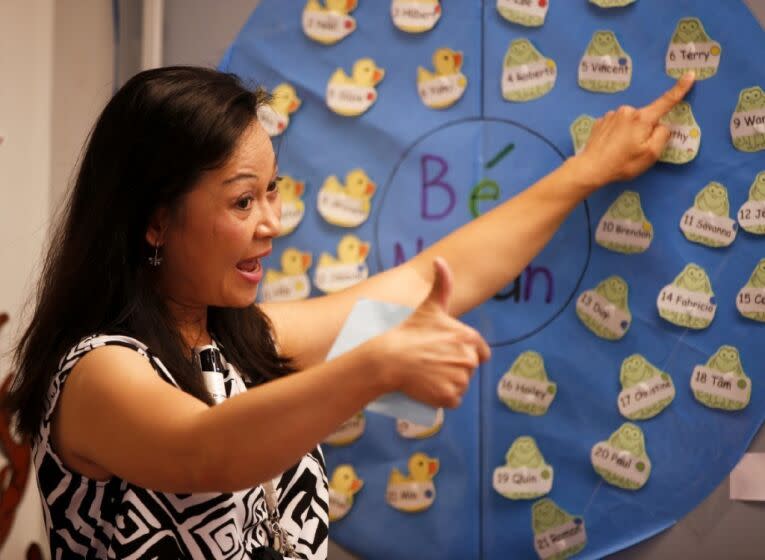California's shortage of diverse teachers is hurting students, educators say

When Lindsey Horowitz, a special education teacher in Los Angeles, made the career switch from nonprofit work to teaching, she knew it wouldn’t be an easy job.
Horowitz, like many educators of color, entered the profession because she did not see enough teachers who looked like her when she was in the classroom, throughout her K-12 education. But California, the second-most diverse state in the U.S. after Hawaii, is struggling to retain its educators, especially teachers of color.
“I always wanted to be a teacher, and I knew that working with students with disabilities would be challenging,” she said. “But I also understood what it's like to feel like you're a little bit different in the classroom.”
According to a 2022 survey by the National Education Assn., Black and Latino educators were likely to quit the profession earlier than expected due to lack of career support and poor working conditions.
But Horowitz tries to keep a positive outlook about the profession.
“There is a desire to change the way that we've done things,” she said. “We can see how we can do things better.”
She and other teachers, advocates and education policy experts met in Sacramento this week for the #CABuildingBridges Summit to discuss how to recruit and retain teachers of color in California. At the all-day gathering of about 100 educators, leaders called on state policy makers not just to pass legislation, but to create structures that reinforce new policies.
“To see a structural shift, we need greater support and oversight by the state. At a minimum, who at the state level is assessing the impact of all these programs?” said Sarah Lillis, the California director of Teach Plus, a nonprofit education leadership organization co-organizing the event. “Our hope is that this group of folks coming together can set that vision.”
At the summit, educators spoke about the lack of diversity in teacher preparation programs and at schools. According to a 2022 survey of more than 4,600 teachers by the UCLA Center for the Transformation of Schools, educators reported experiencing high levels of work-related stress, with 40% saying they’ve considered leaving the profession and 20% saying they will probably leave within three years.
Burnout was listed as the top reason teachers considered quitting. Other issues included large workload, low pay, student behavioral issues and lack of career and administrative support.
Students of color are at a disadvantage if they don’t have teachers who resemble them, educators at the conference said. In California public schools, about 77% of the K-12 population is made up of students of color, while educators of color account for 37% of teachers.
Studies show that teachers of color serve as mentors and role models and increase the academic outcomes of students of similar backgrounds.
“We don’t need more data to tell us how important it is for students to have a teacher that racially identifies like them in the classroom,” said Kai Mathews, project director of UCLA’s California Educator Diversity Project. "It’s important to their sense of belonging, to their understanding of the material and the world around them.”
Educators at the summit said the lack of early-career support for people of color contributes to large numbers leaving the profession. Teacher preparation programs, usually completed after earning a college degree, greatly impact an educator's potential to stay and thrive in the profession. Teachers of color in particular tend to struggle during this phase of their careers — unable to make a living, pass inequitable credentialing tests or find a community at their school site, according to the UCLA study.
Shireen Parvi, assistant vice chancellor of the California State University Educator and Leadership Program, said incoming educators often said that teacher preparation programs, in addition to license and testing fees, were too expensive. Some worked multiple jobs to make ends meet, she said.
The UCLA study confirmed this. About 80% of teachers said it was difficult to find affordable housing near their school site, and 68% said it was hard to manage basic expenses.
Recruitment rates of teachers of color in California are rather steady, Mathews said. But keeping educators in the workforce hasn’t been easy.
“If we're not able to provide an environment where this career is tenable, we won't be able to retain the numbers that we want,” Mathews said. “We want to provide racial equity so that we're not just asking teachers of color to come into education, but we're actually creating an environment where they're respected, have a sense of belonging, and can thrive.”
Educators at the summit also highlighted programs aiming to increase accessibility to the profession. Margarita Jimenez-Silva, a professor at the UC Davis School of Education, oversees a program that prepares teachers for multilingual education in California. About 92% of those in the program became teachers within the last three years, she said.
Steve Bautista, program coordinator for the Center for Teacher Education at Santa Ana College, said funding should be set aside to develop more of these programs on community college campuses.
“We are the access point for education for all of California,” Bautista said. “We represent the diversity of our state, but oftentimes we are not at the table as key stakeholders in this process.”
Laura McGowan-Robinson, founder of the Diversity in Leadership Institute, said recruiting administrators of color is vital to maintain a diverse teacher workforce.
Data show that more than 70% of public school principals in California are non-Hispanic white.
“While I don't believe that educators of color should bear the sole responsibility of fixing the system that has historically marginalized and oppressed them, I do believe that we have valuable insights and experiences and can use our collective power to disrupt, dismantle and correct these systems for our children,” McGowan-Robinson said.
This story originally appeared in Los Angeles Times.

